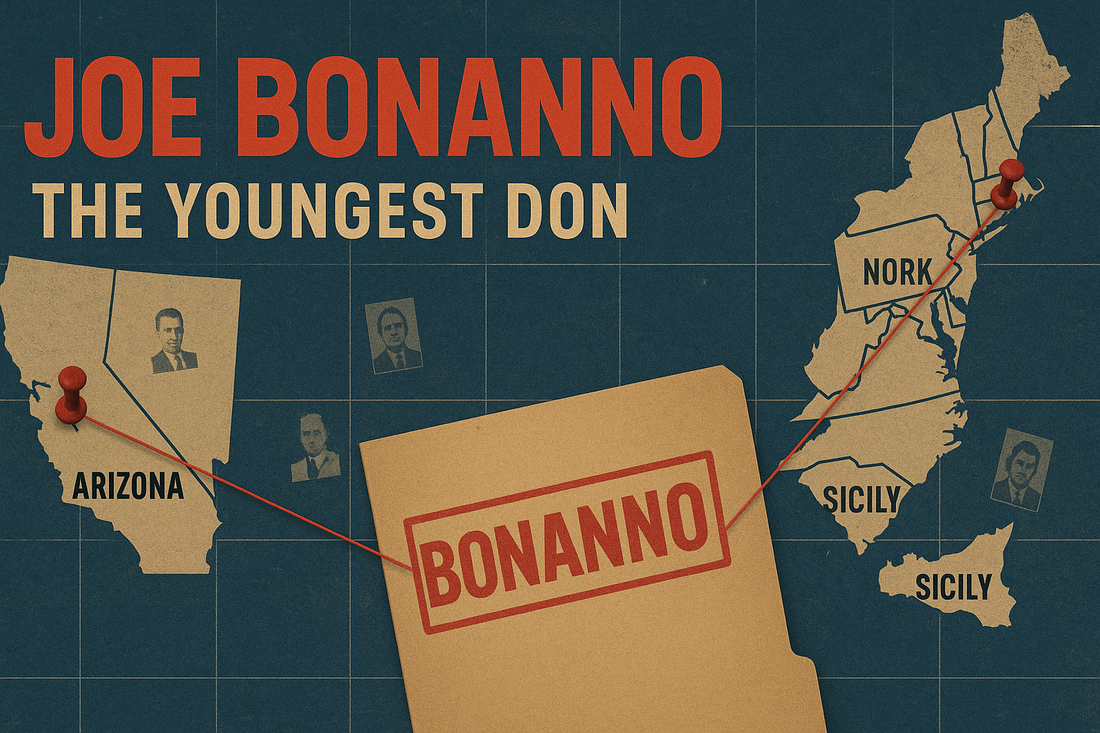
The Rise of Joe Bonanno: How a Young Immigrant Outsmarted the Mafia’s Old Guard
The Rise of Joe Bonanno: How a Young Immigrant Outsmarted the Mafia’s Old Guard
A Boy from Sicily, A Mind for Power
Before he was “Don Peppino,” before his name was etched into Mafia history, Joe Bonanno was just a boy from Castellammare del Golfo — a small coastal town in Sicily where loyalty ran thicker than blood and silence was law. He wasn’t born into wealth. He wasn’t raised by gangsters. But he came to America carrying something far more dangerous than muscle: a plan.
In the early 1900s, waves of Sicilian immigrants poured into New York, fleeing Mussolini and poverty. Bonanno was one of them. But unlike most, he didn’t waste time hustling in the streets or waiting for a seat at the table. By 26, he had a table. At an age when most mobsters were still earning their stripes, Joe was a boss — running one of the Five Families of New York, the Bonanno crime family, named after him. That kind of rise was unheard of. But Bonanno didn’t play by the old rules — he rewrote them.
While other bosses used fear and flash, Bonanno used brains. He avoided the spotlight, ran his empire like a business, and kept a clean image. No flashy suits. No screaming. Just strategy. He played the long game, winning allies with quiet loyalty and removing enemies with subtle precision. The old guard underestimated him. That was their first mistake.
At the core of his rise was the Castellammarese War, a brutal power struggle in the early 1930s between two Italian factions: the old Sicilian mustache petes led by Salvatore Maranzano (Bonanno’s mentor) and the Americanized young bloods under Joe “The Boss” Masseria. Blood ran in the streets. Bodies dropped daily. And Bonanno was right in the middle — watching, listening, learning.
When the smoke cleared, both Maranzano and Masseria were dead. The war had decapitated the old Mafia power structure. And out of the chaos, five families rose — Bonanno among them. At just 26, he became the youngest boss in New York’s Cosa Nostra. And unlike many others, he wasn’t a puppet. He was a player.
Bonanno’s genius wasn’t just surviving that war — it was capitalizing on it. He knew when to strike and when to stay silent. He backed the right alliances. He kept his crew tight. And while the other families fought for scraps, Bonanno built an empire.
But what made him truly dangerous wasn’t his rise. It was what he did once he got the throne.
The Silent Architect of the American Mafia
While other bosses were chasing headlines, Joe Bonanno was building blueprints. He wasn’t in it for the fame. He didn’t want the spotlight, the front pages, or the celebrity treatment that mobsters like John Gotti would crave decades later. Bonanno understood something the rest didn’t — real power is invisible. The more you’re seen, the easier you are to hit.
He styled himself like an executive, not a thug. He dressed sharp but modest. He spoke softly, even in private meetings. His soldiers respected him not out of fear — but because they knew he was always ten steps ahead. Bonanno didn’t need to raise his voice. He just needed to nod. And people would move.
Joe had a hand in shaping the very structure of the Mafia as we know it today. After the Castellammarese War ended and the Five Families were formed, it was Bonanno who helped solidify the Commission — the ruling body of the American Mafia. The goal? Prevent future wars, maintain order, and keep business flowing without blood in the streets. It was organized crime — finally organized.
Behind closed doors, he was forming alliances with other bosses like Luciano, Profaci, and Mangano. And while outwardly he was loyal to the system, Bonanno always had his own vision — a version of the Mafia where his influence reached further than New York, all the way to California, Arizona, and even Canada.
Unlike other dons who ruled their neighborhoods with brute force, Bonanno exported his power quietly. He sent trusted men to open legitimate businesses and real estate deals across state lines. He forged alliances with mob outfits in Montreal, making him one of the first bosses to build a true international network. He understood that drugs, labor racketeering, and unions were all pipelines to bigger money — and he controlled them with surgical precision.
This wasn’t about street corners anymore. It was about institutions. Joe Bonanno wasn’t just running rackets — he was embedding himself in industries, laundering money through real businesses, and using his clean image as camouflage. And while FBI eyes were fixed on louder families, Bonanno’s family kept stacking paper, undisturbed.
But for all his brilliance, Joe had a fatal flaw — ambition. He wasn’t satisfied with his seat at the table. He wanted the whole table. And that’s where his empire would start to crack.
The Banana War: When Loyalty Turned into Rebellion
By the 1960s, Joe Bonanno had outlasted nearly every other boss from his era. He was still in power. Still respected. Still feared — but not in the way Gotti or Gigante were feared. Bonanno was the quiet storm. The thinking man’s don. But deep down, something shifted. He wasn’t content just running his family. He wanted to control all the families.
That’s when the so-called Banana War began — and it almost burned everything he built to the ground.
Bonanno hatched a secret plan to take out key Commission members and replace them with men loyal to him. He believed the Mafia was getting soft, sloppy, and too exposed. He saw himself as the only one smart enough, disciplined enough, and old-school enough to return the Mob to its roots. But plotting against the Commission was the ultimate sin. And when word got out, the other bosses didn’t hesitate.
Suddenly, Joe Bonanno vanished. Literally. For nearly two years, no one knew where he was. Some believed he was in hiding. Others claimed he had been kidnapped. His son Bill Bonanno, who was being groomed as heir to the family throne, was left to hold things down — and that’s when hell broke loose.
The Bonanno family split into factions. Those loyal to the old man, and those loyal to the Commission. The streets of Brooklyn and Queens lit up with gunfire. Bombings, ambushes, bodies dumped in alleys. It was war — not just between mobsters, but between ideologies. The old Mafia values versus the new wave of greed and exposure.
This wasn’t just a power struggle. It was personal. Joe had broken the unspoken rule: never bite the hand that feeds you. And now, his own family was bleeding out in the streets because of it. Law enforcement smelled the chaos and moved in. The Bonannos went from one of the most respected families to the most unstable. Informants started flipping. Trust eroded. And for the first time, Joe Bonanno — the chessmaster — was on defense.
When he finally resurfaced in 1966, claiming he had been “kidnapped,” few believed him. It felt like a face-saving excuse. His empire was crumbling. His allies were gone. And the Commission had already decided: Bonanno was out. Quietly exiled. No ceremony. No bullet. Just banishment — the coldest punishment a don could receive.
But Joe didn’t go out in a blaze of gunfire. He didn’t flip. He didn’t beg. He simply left. Retired to Arizona, wrote a book, and lived out his days in peace — while the Mob tore itself apart in New York.
The Boss Who Walked Away
Joe Bonanno did what almost no mob boss ever could — he walked away alive. No prison cell. No bullet to the head. No courtroom breakdown. Just sunshine, silence, and a retirement most mobsters only dream about. He moved to Arizona, slipped into suburbia, and rebranded himself as a gentleman of quiet means. And the wildest part? He wrote a damn memoir.
“A Man of Honor,” published in 1983, was his personal tell-all — a soft-spoken middle finger to the Mafia’s code of silence. In it, he talked about loyalty, family, faith, and the life he led in Cosa Nostra. Sure, he avoided spilling specific names and crimes. But the fact that a former Commission member sat down and told any of the story was a shock to the underworld. To some, it was betrayal. To others, it was genius. Joe Bonanno was telling his story before anyone else could twist it.
He died in 2002, at 97 years old — not in a hail of bullets, but in his home. Surrounded by family. Respected by those who still believed in the old ways. By then, the Mafia was already fading. The streets weren’t the same. Surveillance was everywhere. Loyalty was rare. And informants were common. Bonanno had seen it coming. That’s why he stepped back. That’s why he never reached for the throne again. He knew the game had changed.
Joe wasn’t just a mobster — he was a tactician. A philosopher in a world of thugs. He understood image, timing, and control. He didn’t care about headlines or flash. He wanted legacy. And in that, he succeeded. No other boss from his era lived as long, influenced as much, or wrote the final chapter of their life on their own terms.
But his story is a contradiction. A man of honor who betrayed the Commission. A quiet don who tried to control it all. A loyalist who started a war. That’s what makes Bonanno’s story so compelling — it doesn’t fit cleanly into the typical mob narrative. He was too smart for that.
And maybe that’s the point. In a world built on silence, violence, and betrayal — Joe Bonanno didn’t just survive. He outsmarted the entire system. And in the end, he didn’t go down as the most feared… but he just might’ve been the most dangerous of them all.







